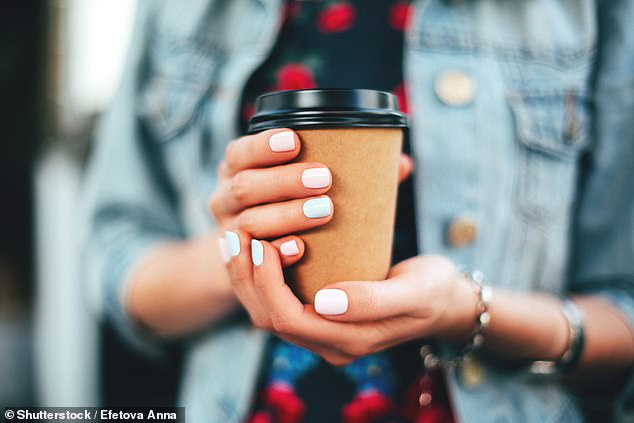Table of Contents
For millions of tired parents juggling kids and work, a steaming cup of coffee (or six) is a crucial support to get through the day.
But what do you do if, like me, you can’t consume caffeine at all?
Or are you one of the many looking to cut back after experiencing some of the side effects, such as twitching or nervousness?
Caffeine intolerance, which began in my teens, means that even the slightest trace can make me feel so weak and dizzy that I can’t function, as well as causing severe nausea and tremors.
As such, coffee, tea, colas, energy drinks and even dark chocolate are off the table.
So as a 36 year old working mother, how do I survive?

For millions of tired parents juggling kids and work, a steaming cup of coffee (or six) is a crucial support to get through the day. But what do you do if, like me, you can’t consume caffeine at all? Pictured: Rosie Taylor


Rosie Taylor, a 36-year-old mother who has a caffeine intolerance, says her tricks for staying alert without coffee include drinking plenty of water and eating a good breakfast (file image).
Keen to know if I had stumbled upon a magic trick, I shared my go-to methods with Kate Hilton, registered dietitian at Feelgut.co.uk and dietsdebunked.co.uk.
She told me which ones work for me and which ones don’t, and what you should do if you’re also thinking about quitting caffeine.
Drink plenty of water
I always carry a bottle of water everywhere and take a sip whenever my energy levels start to wane.
Kate approves, as she says dehydration is a key cause of tiredness.
“If you’re dehydrated, everything in your body works harder, so staying hydrated is key,” he adds.
Go outside, even if it’s just for a few minutes.
I usually start the day with the school run.
It’s only a five-minute walk, but the blast of fresh air and physical activity helps me stay alert at my desk all morning.
Kate agrees that even a brief moment outdoors can be a boost of energy.
“The way many of us live today is not natural,” he adds.
‘Many of us spend all day looking at screens and our free time is also very sedentary.
“Getting outside and seeing sunlight can improve your mental health, help recalibrate your circadian rhythm so you can sleep better at night, and help increase vitamin D levels, all of which can help combat fatigue.”
Eat snacks to give you a boost
My main secret to surviving the mid-afternoon slump without caffeine is to turn to sugary or high-carb snacks, like cakes and cookies, and sweet, non-caffeinated drinks, like juice or lemonade.
Kate agrees that there are times when we all “just need an emergency brownie”, but warns that we shouldn’t rely solely on sugary snacks as they can cause energy levels to spike and then crash, making us feel worse.
“If possible, accompany your snack with something healthier like a handful of raspberries or a protein yogurt,” he suggests.
“Mixing carbohydrates and sugars with protein, fiber and healthy fats helps slow down the release of energy so there is a less intense drive and then crash.”
Find delicious herbal teas
I don’t mean to claim that herbal tea is as satisfying as a regular cup of tea or coffee, but they can help as a warming stimulant, especially in winter.
I splurge on quality brands with lots of flavor (like YogiTea or Clipper), so it feels like a treat.
Kate agrees that herbal teas can give you a boost, but cautions that you should always check the label, as some herbal teas, including green tea, contain caffeine.


A cup of instant coffee contains about 100 mg of caffeine, and other sources include tea, colas, and energy drinks.
Start the day with breakfast
I can’t do anything in the morning before I have eaten something; I feel exhausted and sluggish if I haven’t eaten at least some toast or cereal first thing in the morning.
Kate says the energy from food is vital to get us going. Caffeine can artificially replace this boost, but it can cause energy levels to crash as it wears off.
She says my breakfast options are okay, but they could be better. She recommends a combination of protein (like milk, yogurt, or eggs), whole-grain carbohydrates (like cereal or toast), fruits and vegetables (like berries or tomatoes), and healthy fats (like nuts and seeds).
“This helps the energy burn slowly so you don’t fall asleep or get tired mid-morning,” he says.
Listen to your body and take a break
Without caffeine to keep me energized, sometimes I just run out of energy and have to relax for half an hour on the couch or take a nap.
I hate to admit defeat, but Kate says this is actually a good thing.
“We are all so busy that we continually overcome fatigue and don’t recognize that we need to rest,” he adds.
Taking breaks isn’t easy in the modern world, but even half an hour to yourself every day can help.
He adds: “Realistically, if we’re getting to the point where we’re relying on caffeine to keep us going, it’s probably time to stop.”

